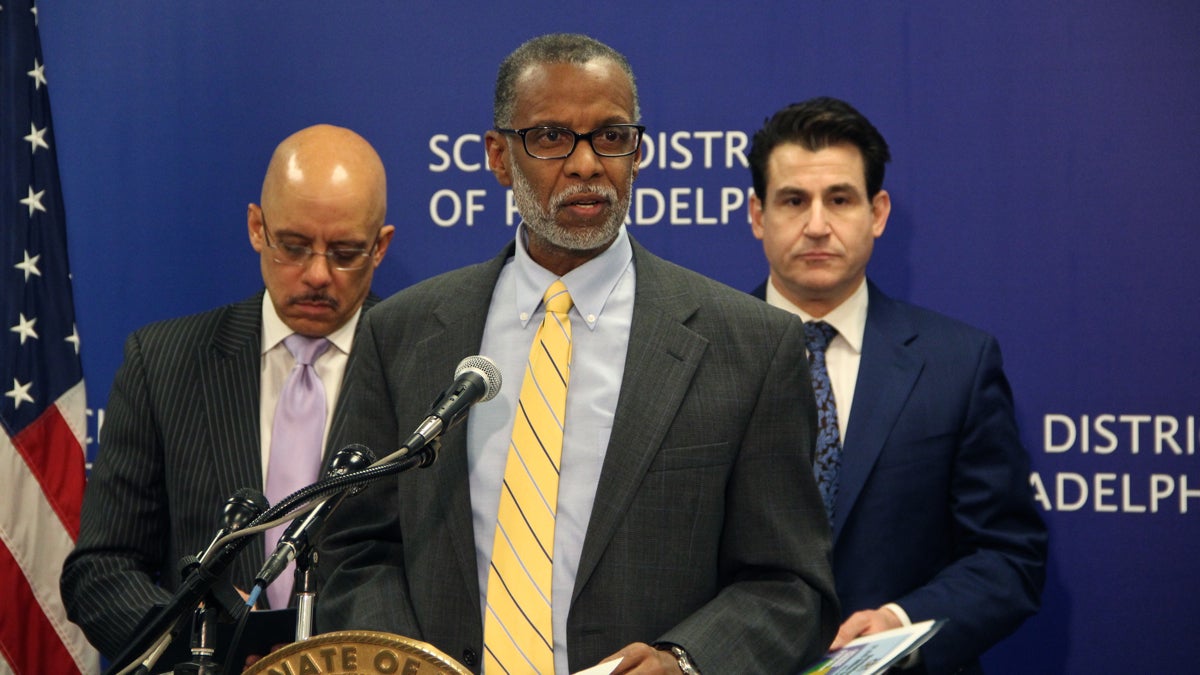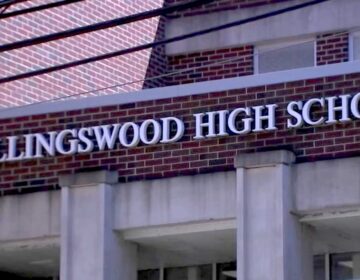Pa. lawmakers propose 8 percent shale tax to help fund schools, pensions, environmental initiatives

(From left), Pa. Sens. Vincent Hughes, Art Haywood and Larry Farnese announce legislation that would tax Marcellus Shale extraction at 8 percent, with the bulk of proceeds going to schools. (Emma Lee/WHYY)
Pennsylvania is the only major gas-producing state that doesn’t tax extraction — beyond a relatively small impact fee.
Some Republicans and Democrats are calling that a major lost opportunity to put money into a state looking at a $2.3 billion deficit and where school funding has been drastically cut.
Gov. Tom Wolf ran on platform that included imposing a 5 percent extraction tax. This week, two cohorts of state legislators made public their own plans to tax shale production in the state to raise funds for education, the pension systems and the environment.
First out of the gate was a 3.2 percent tax led by Rep. DiGirolamo, R-Bucks. Combined with the state’s current impact fee, DiGirolamo said, the total amount generated would approximate Wolf’s goal of a 5 percent tax — or about $600 million in the first year.
Reps. Tom Murt, R-Hatboro, Harry Readshaw, D-Pittsburgh, and Pam DeLissio, D-Philadelphia have all backed that plan.
The impact fee is about $50,000 for each new well in its first year of operation; smaller wells bring in about $10,000 for their first year. That fee is levied for 15 years and decreases annually. Sixty percent of that money stays with the counties and municipalities where the wells are located, and the rest goes to the state. Impact fees are expected to be included in any proposals for new taxes.
Setting the bar on the high end, Democratic state Sens. Art Haywood, Vincent Hughes and Larry Farnese focused on putting money back in the state’s education coffers with their plan for an 8 percent shale tax. Texas – the only state to produce more shale gas than Pennsylvania – has an extraction tax of 7.5 percent.
At a press conference held at Philadelphia School District headquarters, Haywood called 8 percent “affordable.”
“Some people are going to say that it’s extreme,” said Haywood. “Eight percent is not as extreme as zero, which is what we have now.”
With that plan, the state would raise more than a billion dollars in revenue in the first year, Haywood said. Off the top, $100 million would go to environmental concerns, with the rest of that revenue split 60 percent for education and 40 percent to defray pension costs.
This is the second time Hughes, the Senate’s Democratic appropriations chair, has proposed an extraction tax for education. Last year, he introduced Senate Bill 1333 calling for a 5 percent tax.
Standing with Jerry Jordan, head of Philadelphia’s teachers union and Philadelphia mayoral hopeful Nelson Diaz, the three lawmakers pledged to funnel education money toward shortfalls in school funding.
“I’ve heard stories of kids in schools that don’t have toilet paper … is that who we are?” said Haywood.
Meanwhile, the state’s Republican leadership has said a shale tax is off the table – instead focusing on pension overhauls and liquor privatization to address the $2.3 billion deficit and calling the shale tax a “business tax.”
To that, Haywood said, the millions his plan allots for pensions would help right away – while structural overhaul may take years. Over time, the proposed tax would bring in almost $2 billion a year, he said.
More legislators are expected to announce their own proposed tax rates, somewhere between the 3- to 8-percent range already proposed, in the coming weeks.
While public education advocates have been beating the drum for a gas tax linked to education, it’s unclear how these bills will play out in a Republican majority legislature.
For more information on the shale industry side of the this calculation, check out State Impact.
Correction: An earlier version of this story did not include how many years Pennsylvania levies an impact fee for new wells.
WHYY is your source for fact-based, in-depth journalism and information. As a nonprofit organization, we rely on financial support from readers like you. Please give today.




